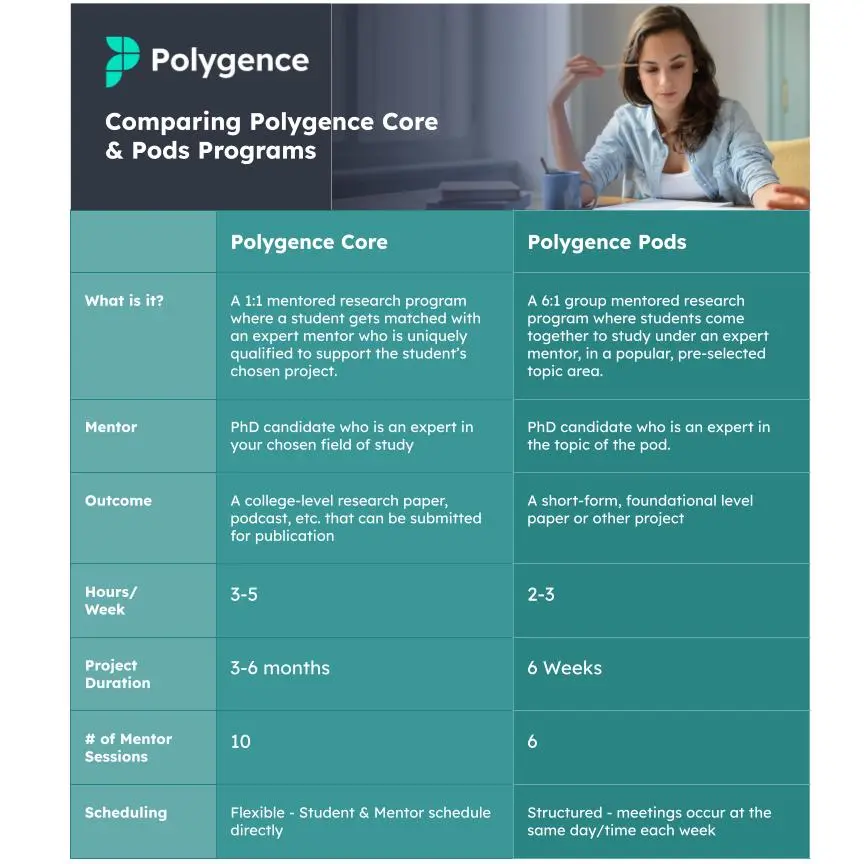Passion Projects for High School Students: Why They’re Important and How to Get Started
7 minute read
Passion projects are a great way for middle and high school students to: build skills, stand out when applying to college, internships, or summer research opportunities, and explore careers. Funnily enough, I first recognized the value of a passion project after I completed high school.
In my sophomore year of college at NYU, my social entrepreneurship professor assigned us a passage from the book Range by David Epstein. The beginning describes a young man’s seemingly endless career journey. One second, he wants to draw and be an artist, the next second, he wants to sell art, then he wants to be a preacher, and then somehow, he’s back to drawing. This man was Vincent Van Gogh.
Epstein suggests that this long journey to find what one is good at in one's career has to do with Northwestern economist Ofer Malamud’s research on match quality, a term used to describe the degree of fit between the work someone does and who they are.
Malamud found that those who specialized in their field later switched jobs less in their career, signaling that they had greater match quality. Those who had taken a greater variety of topics in school also seemed to have lower unemployment rates. As Epstein summarizes, “Exploration is not just a whimsical luxury of education; it is a central benefit.”
High school students can benefit significantly from exploring topics that interest them, especially if they are considering a career in that field. Now that we’ve established the benefits of engaging in a high school passion project, how do you get started? One great option is joining a Polygence Pod!
Here at Polygence, students have the opportunity to work in small groups of like-minded peers with one of our expert research members. Over the course of 6 weeks, students will receive a combination of individualized and group instruction that covers a specific career or research topic, such as gene editing, the stock market, artificial intelligence, black holes, and cancer treatment research. In addition to learning alongside their peers, students will create their own customizable research projects.
What is a Passion Project and Why Should You Do One?
A passion project is an individual project that you initiate to learn more about an area you’re excited about. One of the great things about a passion project is that the final product can pretty much be anything! It doesn’t have to always look like a paper or presentation, and you are in charge of your project, so you decide which direction to go in as you explore your passion.
By taking on a passion project, middle and high school students can:
1. Learn about career paths
When students dive deep into a field like biology, entrepreneurship, or computer science, they can get exposure to the same kinds of problems/topics that industry professionals deal with. As a result, students can truly understand what being an entrepreneur or a software engineer might be like and not just make surface-level judgments about specific careers.
When working with a research mentor to do their passion project, students can get additional guidance and valuable insights into a certain industry or career.
2. Distinguish themselves with a research opportunity and college applications
A passion project can demonstrate to program administrators and admissions offices that a student has the initiative to pursue something that interests them and can also take ownership of a project. It can show what a student is excited about and why they may want to pursue research or choose to concentrate in a particular field of study.
3. Do something they truly enjoy
School can sometimes be a bit dry. Passion projects give students complete control over what they want to explore, which allows them to be excited about learning. I personally became excited about learning when I began learning about technology startups outside of school. I was fascinated by technological innovation and the challenges of scaling a business. It was a completely different feeling from learning in school, because it was something I wanted to learn more about, and I felt more motivated as a result.
Academic research has confirmed this difference: researchers from the University of California found in a 2014 study that “People are better at learning information that they are curious about.” At Polygence, we’ve also seen many students who start our program with the intention of boosting their college applications and resumes, but by the end, they’ve expressed how their project has helped them feel a sense of pride and excitement for what they’re learning about.
Do your own research through Polygence!
Polygence pairs you with an expert mentor in your area of passion. Together, you work to create a high quality research project that is uniquely your own.
When Should You Start a Passion Project?
Given how there are benefits to exploring a variety of topics and careers, when is the best time to start exploring your passions?
Many would argue that college is the time for students to start exploring career paths. This was actually when I began exploring careers. But why not begin earlier? The story of Vincent Van Gogh is one of a long winding path that extends throughout his life, but many people might not have the luxury of exploring careers for that long. Starting before applying to college allows middle and high school students to have more time to explore topics and find what excites them, which can then allow them to make better decisions about which college they want to attend or what they want to major in. Additionally, students can use their passion project on college applications to demonstrate personal motivations, experiences, and abilities.
How Do You Begin Your Passion Project?
Not sure how to begin your passion project? Don’t worry! Just follow the 6 steps listed below.
1. Choose a project topic that excites you
Think about a topic that you care about and would have fun learning more about. You have the freedom to decide, so make sure it’s something worthwhile. At the same time, the topic doesn’t necessarily have to be something you know well or something you want to do for your career - the whole point is to explore so that you can decide whether it’s something that interests you. If you’re having trouble coming up with a project topic, check out our article on how to brainstorm great project ideas. You might also want to check out our article, 77 passion project ideas for high school students.
2. Think about what you want your project outcome to be
Passion projects don’t have to always culminate in a presentation or paper. You can take many different paths to present your work and what you’ve learned. We’ve seen students create an original children’s storybook, a wearable device prototype to track the onset of COVID-19, websites, podcast episodes, and so much more! If you’re still stuck or want some inspiration, check out this list of exciting passion project ideas for high school students.
Moreover, final project formats don’t necessarily need to be set in stone before starting to learn about your topic. You may have a better sense of what you want your project outcome to look like as you start doing research. But beginning to think about what the final product may look like as you start out can be helpful as you carve out your project path.
3. Set intermediary project goals for yourself
Now that you’ve thought about what you want your project outcome to be, you can work backward from that to set intermediary goals for yourself. This can help you to stay on track and motivated as you progress in your project. Breaking up the project into manageable chunks can feel more achievable than just sprinting towards completing your project. It will also give you a better chance of producing quality research or work if you’re working on the project on a consistent basis.
A goal also does not have to be complicated. It could be something as simple as “find 3 more resources in the next week to help support my argument.” You don’t even necessarily need to include hard deadlines with those goals - just recognize what you need to accomplish next in order to move your project forward.
4. Pinpoint the project resources you’ll need
Different passion projects will require different resources. If you’re planning on writing a research paper, then maybe all you need are some books or online resources. If you’re planning on making a podcast, however, you might want to invest in some recording equipment. Think through what you might need for your project and make sure you obtain those resources early on in your journey so you don’t run into any delays.
5. Consider potential project mentors
Going after a passion project on your own can have its challenges, which is why a mentor can be helpful in getting you past roadblocks and helping you see other perspectives. They can also use their knowledge of your chosen topic to help guide you. Finding a mentor, however, can be difficult, which is why Polygence’s Pod programs offer students the opportunity to work one-on-one with a PhD mentor or industry expert. If you’re interested in learning more about how Polygence mentors work with students, check out Youssef’s student spotlight, where he shares more about his experience working with not one but two mentors!
Get the crowd going
Interested in Sociology? We'll match you with an expert mentor who will help you explore your next project.
6. Just start!
The hardest part about a project can often be starting it! Once you gain momentum the work can begin to feel more manageable. So just start working, whether that’s exploring some initial resources on the Internet, watching some YouTube videos on your topic, or brainstorming ideas for what you want to create.
Passion projects are an excellent way to explore careers, boost college applications, and help students learn about topics they're curious about. Exploration is crucial in helping students learn about themselves and find what excites them the most. And the earlier a student can start, the better!
Conclusion
Completing a high school passion project is an excellent way to explore potential career paths while simultaneously bolstering your college applications. College admissions counselors seek to admit passionate students capable of succeeding both inside and outside the classroom. Passion projects demonstrate your ability to take initiative and pursue educational opportunities beyond a formal school setting.
To complete a successful passion project, you'll need to select a topic you're truly passionate about, set goals for yourself, seek out mentorship, identify specific resources you'll need, and design a meaningful and innovative way to showcase your work. Joining a Polygence Pod is an ideal way to accomplish these goals. Polygence Pods not only provides mentorship and structure but also connects you with like-minded peers who can further challenge and inspire you!
Polygence Scholars Are Also Passionate About
Looking for more information before you enroll? Check our reviews and testimonials from parents and past student scholars. Then, explore our college admissions statistics!

Do your own research through Polygence!
Polygence pairs you with an expert mentor in your area of passion. Together, you work to create a high quality research project that is uniquely your own.
